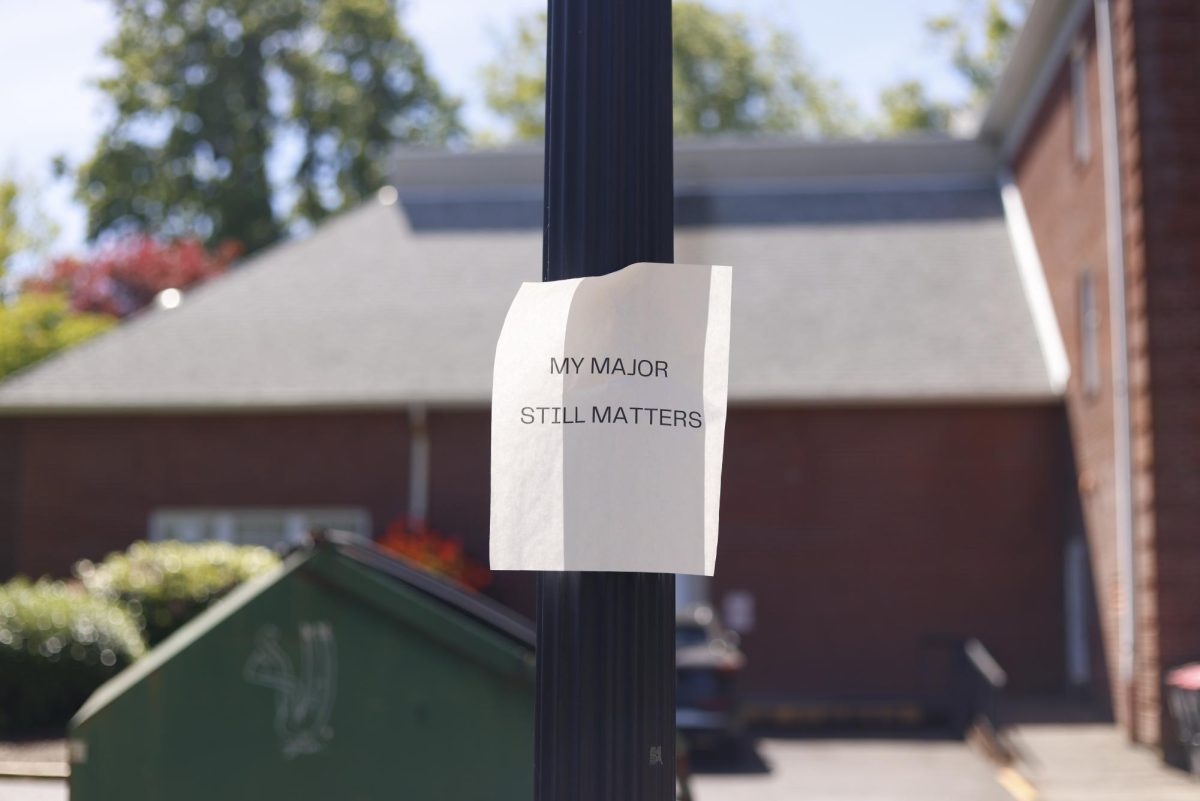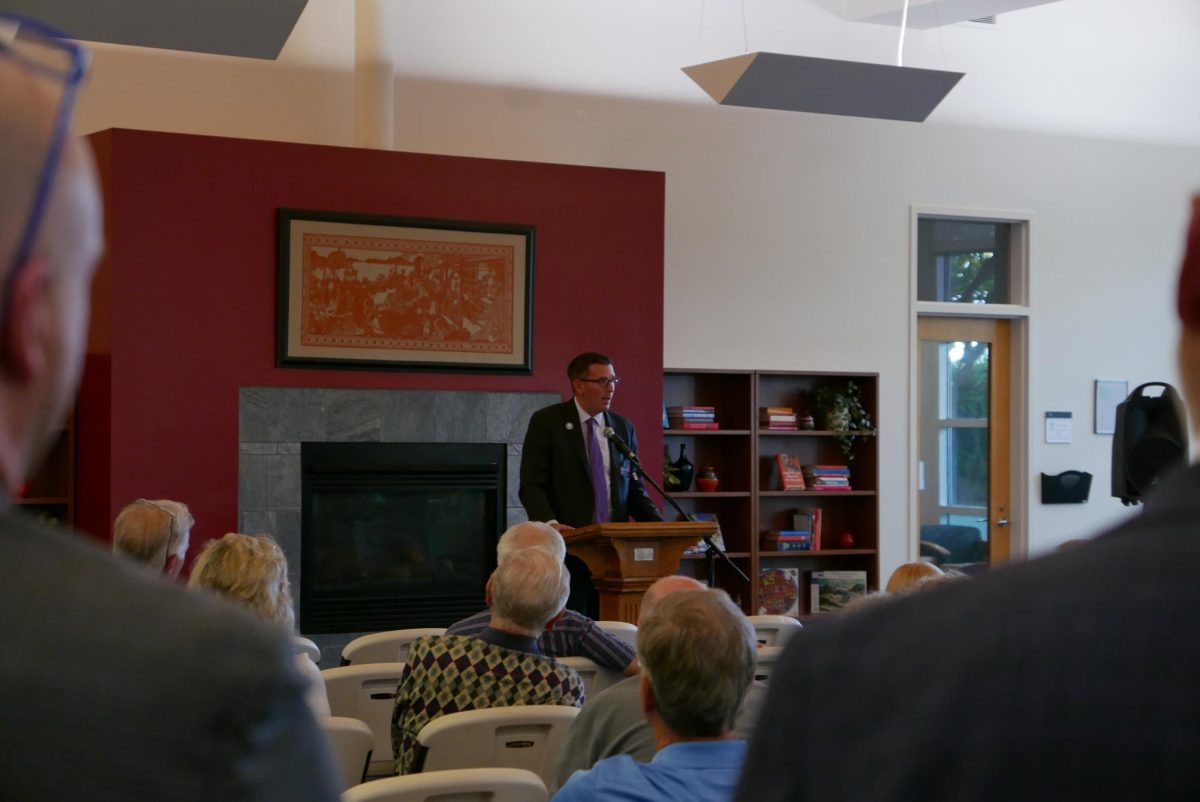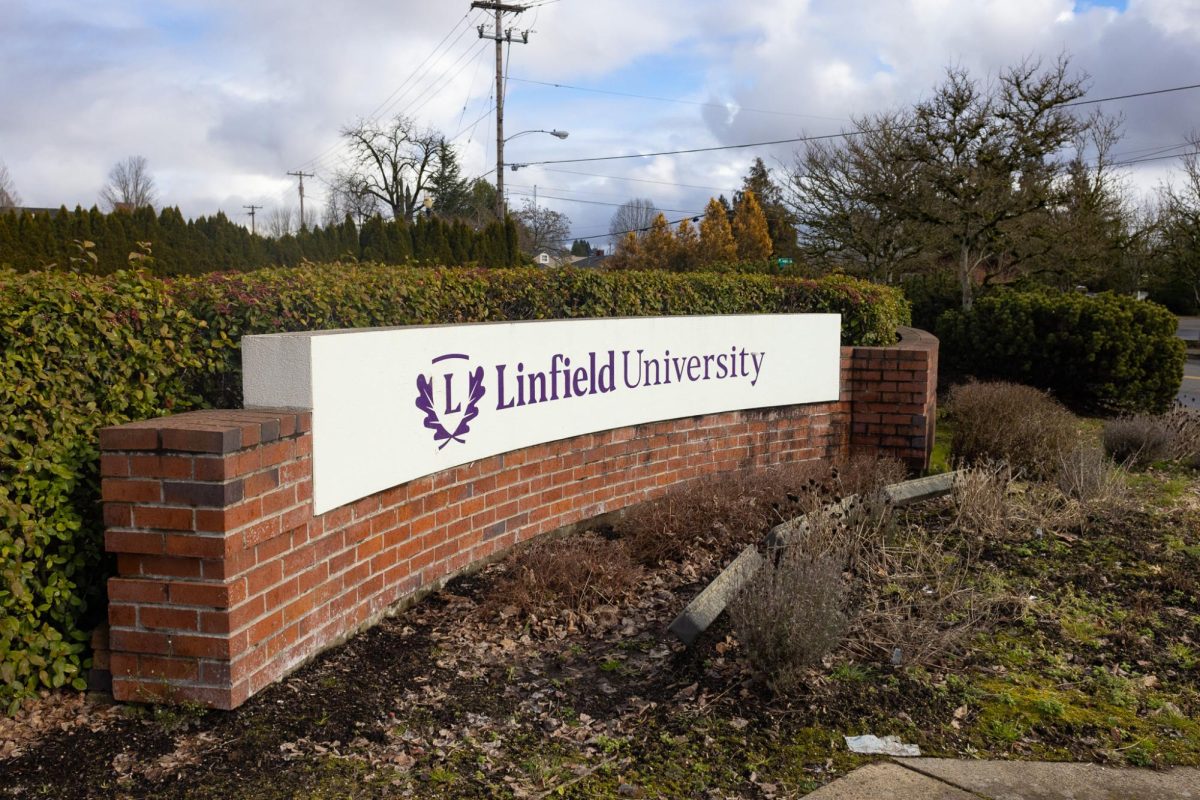Linfield University’s May 14 town hall was meant to answer the many questions that students had regarding cuts which aim to eliminate Linfield’s $4.9 million budget deficit. However, many students felt that in many ways the town hall wasn’t productive.
“I felt like the town hall served the purpose of telling students in depth why budget cuts are needed and vaguely what is on the agenda,” Caroline Smith, a sophomore biology major, said. “However, I don’t feel like it was truly a conversation between students and VPs because it felt more like the VPs defending the same point over and over rather than incorporating student viewpoints and attempting to look at the issue from a new angle.”
Smith was not alone in that sentiment. Many Linfield students sat down to talk about their experiences throughout the past month and explain their thoughts on the proposals to balance the budget. Many of their thoughts echoed others’ opinions, and they all had a very similar root: transparency.
“These budget discussions are simply not benefited by maintaining a barrier between what’s being considered and what students are told,” Colin Bellairs, a junior creative writing and literature major, said.
At the town hall, Provost and Vice President of Academic Affairs Beth Concepción opposed releasing the draft budget proposal to students, citing concerns over the rumors it would create. Bellairs disagrees with this assertion.
“I can respect the possibility of this perspective coming from a place of genuinely positive intent,” Bellairs said. “But I need to acknowledge that all signs, including the misinformation the administration is clearly aware of, point to the fact that cutting students out of discussions is not conducive to them being accurately informed on the subjects of those discussions.”
Bellairs thinks that students should be privy to the information being discussed. For him, there are only positives in students being able to see it.
“The absolute worst outcome from students being aware of the draft’s contents is that they might disapprove of changes before they come into effect,” Bellairs said. “The absolute best time to disapprove of changes, rather than later when the information has finally been ‘declassified.’”
The lack of transparency has caused some students to question the intentions of Linfield’s administration. Hope Bazzi, a sophomore history major and gender studies minor, is one of them.
“There needs to be way more communication,” Bazzi said. “We should be able to see the budget. We should be able to see the proposals, any of this. And they are hiding information from students by deliberately not hosting town halls until the very last minute or having conversations with us. They’re trying to sneak it under the belt that they’re making significant changes.”
Bazzi thinks that if a draft proposal is released to students, it will cause current ones to mention that to prospective students, something that may dissuade them from enrolling.
“Those students know that our current students who are here aren’t going to necessarily be affected,” Bazzi said. “But the next generations of students are going to be affected, they can’t have us knowing, and then badly recruiting future students.”
Another change that students take issue with is super departments. While super departments weren’t mentioned at the student town hall, many students have said they’ve been told about them from faculty.
“[I] sat in on the staff and faculty town hall for a little bit,” Bazzi said. “And when a faculty member asked, [were super departments] mentioned to the students at the town hall last night, they did not answer that question.”
Senior political science major Morgan Ybarra said she thinks super departments are a bad thing, but for a different reason.
“[It’s] the combining of law, rights, and justice, and political science into one major.” Ybarra said. “With literally the name political science, dot, dot, dot, law, rights, and justice, and then cutting international relations, how am I supposed to recommend that to anyone who asks me?”
For students currently enrolled, there are worries that even though they will get to finish their degrees, the quality of them will diminish. Dominic Thompson, a sophomore theater major and music and philosophy minor, worries that the cuts may impact how employers view his degree.
“They see you graduated with a degree that doesn’t exist anymore two years after you graduate,” Thompson said. “What are your employers going to think about that? If the university didn’t value me, why should they?”
During the town hall, it was made clear that anyone who is currently in an academic program would be able to finish it and receive their degree.
There is also criticism from students about the tone that has been taken in communicating proposed changes. At the town hall, several students called out the administration for their tone. One of them was Lizzie Arnold, a senior history major and anthropology minor.
“It was extremely tone deaf and condescending and just really frustrating overall,” Arnold said.
Arnold felt like students were getting talked down to.
“I asked a question, and maybe looking back, I didn’t get my question across well enough,” Arnold said. “But I was trying to say ‘you guys are saying you have a really strong base, and the base is staff, faculty, and students,’ then you want to fire them? That’s frustrating. Mike Wentz, [said] ‘I feel so much, it’s so hard.’ You’re not even answering the question. Having empathy is not the same thing as answering a question.”
Jamison Nemecek, a junior creative writing and philosophy major, believes that the administration is not purposely condescending, just lacking clarity in its answers. .
“What I think has happened, is that we, as a whole, feel like we are being talked down to and treated down a little bit,’ Nemecek said. “Partly because of the lack of transparency. Also because there does feel like there’s a disconnect. Especially in all of the questions not getting answered specifically. Like these non-answers, dodging questions, empty rhetoric, all of this. It feels like there is an active disconnect between students and faculty and staff, and the admin.”
Nemecek says this is why, in part, the proposal should be released to students, even as a draft.
“I’m not certain that it should just be a conversation between admin and faculty,” Nemecek said. “On the faculty side, students are necessarily a part of that. That’s just a part of our culture. In any conversations of what a good proposal should be that comes from the faculty, I think that needs to entail the students.”
There is also skepticism that faculty cuts are what has to happen.
“Why are we looking at faculty first?” Arnold said. “And I think that’s really like this whole plan from faculty, or at least my understanding of it is like, can we reframe the conversation as of now to not think primarily about faculty and staff cuts, because that is going to be the most harmful or one of the most harmful ways that would impact the community.”
Clara Johansen, a senior communication arts major, agrees.
“I think that the faculty know their programs, know their budgets, know their areas of discipline better than the VPs, better than the provost,” Johansen said. “The Provost, from the way that I took her answering questions last night, does not understand the inner workings of this. And I think that is where the problem lies.”
Some also think that there are other ways to reduce costs. Bazzi thinks that the administration taking pay cuts can help lessen faculty cuts.
“If they were to reduce their budgets or their compensation to be closer to that of the actual faculty and to actually reflect the amount of work they do,” Bazzi said. “They could find a million dollars. And that’s not everything. They’re still going to have to account for the $3 million of the budget deficit. But that’s a quarter of the way there.”
Bazzi cited Linfield’s publicly available tax filings, specifically its Form 990 Schedule J filing accessed via the Internal Revenue Service from the 2023 calendar year.
According to these forms, listed on ProPublica, former President Miles K. Davis made $376,100 in base compensation, and $414,091 in total compensation. Vice President of Finance and Administration Mike Wenz made $196,952 in base compensation and $223,864 in total. Vice President of Enrollment Gerardo Ochoa made $161,617 in base compensation and $166,794 in total. Others were included on the form as well.
Compensation information for any Linfield employee may have changed since the 2023 calendar year. The tax filing for the current school year will not be public until the fall.
On the form, in Part III, it details extra benefits provided to former President Davis. These include the President’s house, travel for President Davis’ wife to events where having both Davis and his wife there would be beneficial for the university, and club dues to Michelbook Country Club and the Arlington Club as part of his role. The rationale behind these was for fundraising, meetings, external relations and other things.
Overall compensation for the president is up to the discretion of the Executive Committee of the Board of Trustees. Compensation for officers and key employees is also decided by the Senior Director of Human Services and Administration and reviewed by the university president. This was last reviewed in May 2022, according to the filings.
Senior political science major Morgan Ybarra also recommended reducing the athletic budget.
“To be in track and need a hammer glove or we need new hammers. We got like 6 of them,” Ybarra said. “No one needed to beg. We all got new hammer gloves. No one needed to beg. We got backpacks, sweats, all of these things. No one needed to ask for it. But then, when my professors need literally anything, they have to get on their hands and knees and crawl to the admin. I’m not here for sports, I’m here for an education.”
Ybarra added that hammers typically are $100 to $200.
A few do believe that faculty cuts are what’s needed.
“They are doing the best to minimize damage and be able to have a university to come back to,” Hannah Jones, a junior theater and journalism and media studies major, said. “It is easier to cut of people’s departments so that they’ll be able to finish their major rather than not have a university to come back to.”
Some students worry that their feedback is going to be ignored.
“I don’t know that I trust [the] admin’s claims that they are taking everyone’s viewpoints seriously since we have not seen any actual changes to proposals that take our concerns into account,” Smith said. “I do trust that faculty is working hard to create their own proposals, and I hope that admin is serious about wanting to revise theirs.”
Budget cuts have been a common topic of discussion among students for the last month of the semester. Even with finals approaching, discussion over the topic has not died down. On May 22, Concepción and Wenz held office hours in the Fred Meyer Lounge to discuss the topic further with students. It was also mentioned on Linfield’s official Instagram that more will be scheduled, although no dates were given.
Signs have been posted around campus protesting the faculty cuts, and protests have been present at many closed-door meetings.
“We, as a student body, are engaged and interested and passionate and want to know. And we care about this,” Nemecek said.
As summer approaches, many have said they intend to follow the situation closely. The draft proposal is currently being reviewed by CAS faculty. That review period will close on July 4. It will then be sent to the university cabinet and the Board of Trustees Executive Committee for final approval on Sept. 19. Affected faculty will be notified by Sept. 30.








